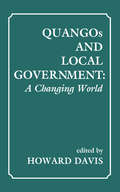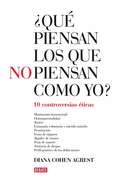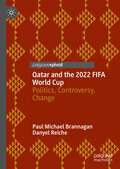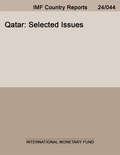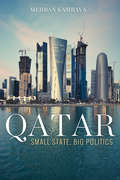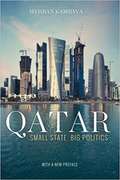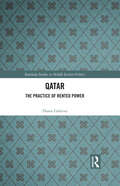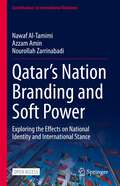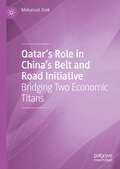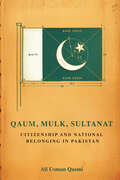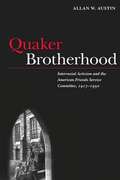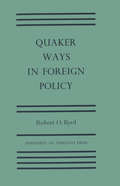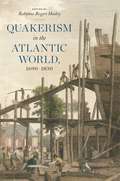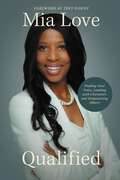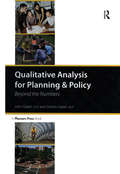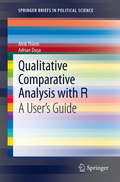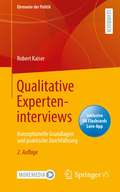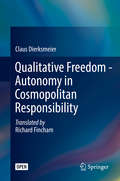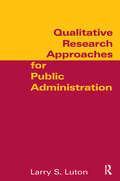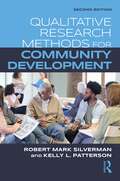- Table View
- List View
QUANGOs and Local Government: A Changing World
by Howard DavisThere is now an appointed world of local governance sitting alongside elected government.this publication seeks to develop understanding of the changing world of local governance and thus contribute to wider debates. The impact of these changes will continue to be felt for many years to come whoever is in government.
QUE PIENSAN LOS QUE NO PIENSAN...(EBOOK)
by Diana Cohen AgrestEl matrimonio homosexual, la homoparentalidad, el aborto, la eutanasia voluntaria y el suicidio asistido, la prostitución, la venta de órganos, el alquiler de vientre, la pena de muerte, la tenencia de drogas, el perfil genético de los delincuentes... todos estos temas son hoy el centro de debates tan resonantes como inconclusos. Pues dudamos de todo aquello que puede ser hecho y, en un único gesto, de qué debe ser hecho. En circunstancias imposibles de ser procesadas y asimiladas, inmersos en situaciones límite sobre las cuales, tarde o temprano, deberemos pronunciarnos. Deslizándose en los márgenes de lo "políticamente incorrecto", este nuevo ensayo de Diana Cohen Agrest nos acerca las razones esgrimidas en torno de estas prácticas polémicas que, de otro modo, suelen permanecer confinadas en los círculos de los especialistas. La premisa básica que atraviesa esta obra es la necesidad de alentar el pluralismo, que implica la coexistencia, en igualdad de condiciones, de diferentes perspectivas desde las cuales reflexionar sobre la realidad que nos toca. Lejos de adoptar una posición que clausure el debate, la autora ofrece los argumentos a favor y en contra de cada una de esas cuestiones, desafiando al lector a tomar una decisión crítica propia. A todos nos gusta opinar fundando nuestras creencias en razones valiosas. Porque sentimos que así colaboramos en la construcción de un mundo un poco mejor. Si el don de la palabra instaura con el hombre el universo simbólico, podemos ser partícipes de la construcción de aquellos valores que, hoy como siempre, deberían sostener cualquier conducta humana. Qué piensan los que no piensan como yo? contribuye a este fin con claridad, profundo conocimiento y valentía.
QUE SIGNIFICA SER PROGRESISTA EN (EBOOK)
by Fernando IglesiasEn 2004 Fernando A. Iglesias sacudió a intelectuales, políticos y periodistas con la publicación de Qué significa hoy ser de izquierda? Reflexiones sobre la democracia en los tiempos de la globalización. Aquel ensayo, lúcido y descarnado, irónico y valiente, ponía en cuestión la comodidad de un ideario de izquierda que había quedado desactualizado y proponía nuevos debates acordes al cambio de los tiempos. Cinco años más tarde, Iglesias "hoy diputado nacional por la Coalición Cívica" vuelve a definir el mapa del progresismo argentino proponiendo un modelo ético, republicano y con una nueva distribución del ingreso para nuestro país. Continuación de su trabajo de 2004, Qué significa ser progresista en la Argentina del siglo XXI? pone la discusión en las coordenadas de tiempo y espacio locales, en el país gobernado por el matrimonio Kirchner y en las dificultades de la oposición para construir un modelo alternativo y progresista. Qué significa ser progresista en la Argentina del siglo XXI? discute e ilumina las distintas confusiones del debate político contemporáneo: los límites del nacionalismo y del populismo, el fin del industrialismo que caracterizó al siglo anterior, la cuestión del campo y el análisis de la política kirchnerista como una variedad "débil" del estalinismo, entre otras. En el Parlamento, Fernando A. Iglesias sigue siendo una rara avis. Como intelectual, mantiene su independencia y su sentido crítico. Como político, la lucidez de sus intervenciones en la Cámara de Diputados y en los medios de comunicación lo destacan de la mayoría de sus colegas. Qué significa ser progresista en la Argentina del siglo XXI? es una invitación a recorrer las ideas de una de las voces más originales surgidas del campo intelectual en los últimos años.
QUEM É VOCÊ? Ella A Princesa Encantada
by Osvaldo Cruz Rosaria L. CalafatiUma bela estória sobre uma princesa careca que aprende a acreditar em si mesma! Em um lindo reino, escondido além da Floresta Encantada, vivia uma jovem princesa chamada Ella. Muito diferente das outras princesas: Ella não tinha cabelo. Na maioria das vezes tenta esconder a cabeça com tiaras, lenços bandanas e chapéus; e também não gosta de se olhar no espelho. A Princesa Ella constantemente sonha um dia explorar além das imponentes portas do castelo. No entanto, para fazer isso, ela precisa atravessar o Salão Real, mas há tantos espelhos temidos nas paredes. Esses espelhos são os guardiões da fortaleza e não deixam ninguém passar a menos que a pessoa seja reconhecida. Junte-se à Princesa Ella em sua primeira aventura pelo Salão Real! Por que os espelhos não conhecem Ella? O que a pequena terá que fazer para sair de seu quarto e explorar Floresta Encantada?
Qatar and the 2022 FIFA World Cup: Politics, Controversy, Change
by Danyel Reiche Paul Michael BrannaganThis book offers the first, full academic analysis of the Qatar 2022 FIFA World Cup. Adopting an international relations perspective, the authors critically interrogate the politics and controversy that has surrounded arguably the most controversial sports event ever. In doing so, this text offers up an imperative examination of Qatar’s desired objectives through their investment in global sport and sports events, as well as provides readers with an academic explanation on why major event hosts – such as Qatar – receive so much international scrutiny in the pre-event stage of the event hosting process. On the back of this international scrutiny, this text also provides the first full analysis on how such negative scrutiny has forced Qatar to implement various social-political changes at home.
Qatar: Selected Issues (Imf Staff Country Reports #Country Report No. 14/109)
by International Monetary Fund. Middle East and Central Asia Dept.A report from the International Monetary Fund.
Qatar: Small State, Big Politics
by Mehran KamravaThe Persian Gulf state of Qatar has fewer than 2 million inhabitants, virtually no potable water, and has been an independent nation only since 1971. Yet its enormous oil and gas wealth has permitted the ruling al Thani family to exert a disproportionately large influence on regional and even international politics. Qatar is, as Mehran Kamrava explains in this knowledgeable and incisive account of the emirate, a "tiny giant": although severely lacking in most measures of state power, it is highly influential in diplomatic, cultural, and economic spheres.Kamrava presents Qatar as an experimental country, building a new society while exerting what he calls "subtle power." It is both the headquarters of the global media network Al Jazeera and the site of the U.S. Central Command’s Forward Headquarters and the Combined Air Operations Center. Qatar has been a major player during the European financial crisis, it has become a showplace for renowned architects, several U.S. universities have established campuses there, and it will host the FIFA World Cup in 2022. Qatar’s effective use of its subtle power, Kamrava argues, challenges how we understand the role of small states in the global system. Given the Gulf state’s outsized influence on regional and international affairs, this book is a critical and timely account of contemporary Qatari politics and society.
Qatar: Small State, Big Politics
by Mehran KamravaThe Persian Gulf state of Qatar has fewer than 2 million inhabitants, virtually no potable water, and has been an independent nation only since 1971. <P><P>Yet its enormous oil and gas wealth has permitted the ruling al Thani family to exert a disproportionately large influence on regional and even international politics. <P><P>Qatar is, as Mehran Kamrava explains in this knowledgeable and incisive account of the emirate, a "tiny giant": although severely lacking in most measures of state power, it is highly influential in diplomatic, cultural, and economic spheres. Kamrava presents Qatar as an experimental country, building a new society while exerting what he calls "subtle power." It is both the headquarters of the global media network Al Jazeera and the site of the U.S. Central Command's Forward Headquarters and the Combined Air Operations Center. Qatar has been a major player during the European financial crisis, it has become a showplace for renowned architects, several U.S. universities have established campuses there, and it will host the FIFA World Cup in 2022. Qatar's effective use of its subtle power, Kamrava argues, challenges how we understand the role of small states in the global system. Given the Gulf state's outsized influence on regional and international affairs, this book is a critical and timely account of contemporary Qatari politics and society.
Qatar: The Practice of Rented Power (Routledge Studies in Middle Eastern Politics)
by Diana GaleevaThis book explains the parameters of Qatar’s political growth by developing an alternative theory of power – ‘rented’ power. The author demonstrates how Qatar’s emergence as a regional power can be solely explained by its capacity as a gas-rich rentier state. By using Qatar as an empirical case study of the ‘rented’ power theory, readers will gain insight into Qatar’s engagement with non-state actors (political Islam, tribes, media, sports, and others) to wield its power, allowing Qatar to ‘rent’ the well-established influence of non-state actors due to their transnational nature. The Qatari case demonstrates a state’s ability to establish a patron-client relationship with non-state actors, overcoming limitations set by size or military strength to gain international influence. This book is accessible to a wide readership: it will be of interest of scholars, postgraduates, journalists, policy experts, and a general audience whose interests include the politics of the Middle East and the GCC states particularly
Qatar’s Nation Branding and Soft Power: Exploring the Effects on National Identity and International Stance (Contributions to International Relations)
by Nourollah Zarrinabadi Nawaf Al-Tamimi Azzam AminThis open access book examines how creating a national brand assisted Qatar in absorbing the shock and awe following the outburst of the crisis with Saudi Arabia, Bahrain, Egypt, and the United Arab Emirates in May 2017. The authors discuss the country's diplomatic performance, which was characterized by five main factors that helped Qatar to deal with the crisis successfully. These factors include the failure of the element of surprise, years of building Qatar’s national brand, Qatar's arsenal of soft power, international alliances, and the opponents’ quandary. This book further scrutinizes Qatar’s role in the region and all questions related to this role through the lenses of its nation brand. The book provides explanations for the success of Qatar in absorbing the “shock and awe” in the early stage of the last Gulf crisis, presenting various arguments on how establishing a nation brand helped Qatar to deal with the crisis successfully. The book follows an original approach that views the Qatari case from a scientific perspective, investigating the art of nation branding. It will appeal to students, researchers, and scholars of international relations, psychology, political science, and journalism, as well as policy-makers interested in a better understanding of soft power, nation branding, Middle East studies, and diplomacy.
Qatar’s Role in China’s Belt and Road Initiative: Bridging Two Economic Titans
by Mohamad ZreikThis book provides a detailed analysis of Qatar’s participation in China’s Belt and Road Initiative (BRI). With a particular focus on its economic, social, and geopolitical impacts, it examines how Qatar has used its position within the BRI framework to diversify its economy, strengthen global integration, and increase international trade. By critically exploring the potential risks of the BRI, the dangers of economic dependency, geopolitical tensions, and sustainability are explored in relation to Qatar’s long-term development. This book offers new insights into the ways that small states can leverage international initiatives for economic diversification and development. It will be relevant to students, researchers, and policymakers interested in economic development, the political economy, and global trade.
Qaum, Mulk, Sultanat: Citizenship and National Belonging in Pakistan (South Asia in Motion)
by Ali Usman QasmiAfter the trauma of mass violence and massive population movements around the partition of India and Pakistan in 1947, both new nation states faced the enormous challenge of creating new national narratives, symbols, and histories, as well as a new framework for their political life. While leadership in India claimed the anti-colonial movement, Gandhi, and a civilizational legacy in the subcontinent, the new political elite in Pakistan were faced with a more complex task: to carve out a separate and distinct Muslim history and political tradition from a millennium long history of cultural and religious interaction, mixing, and coexistence. Drawing on a rich archive of diverse sources, Ali Qasmi traces the complex development of ideas of citizenship and national belonging in the postcolonial Muslim state, offering a nuanced and sweeping history of the country's formative period. Qasmi paints a rich picture of the long, arduous, and often conflict-ridden process of writing a democratic constitution of Pakistan, while simultaneously narrating the invention of a range of new rituals of state—such as the exact color of the flag, the precise date of birth of the national poet of Pakistan, and the observation of Eid as a "national festival"—providing an illuminating analysis of the practices of being Pakistani, and a new portrait of Muslim history in the subcontinent.
Quagmire in Civil War
by Jonah Schulhofer-WohlOur understanding of civil war is shot through with the spectre of quagmire, a situation that traps belligerents, compounding and entrenching war's dangers. Despite the subject's importance, its causes are obscure. A pervasive 'folk' notion that quagmire is intrinsic to certain countries or wars has foreclosed inquiry, and scholarship has failed to identify quagmire as an object of study in its own right. Schulhofer-Wohl provides the first treatment of quagmire in civil war. In a rigorous but accessible analysis, he explains how quagmire can emerge from domestic-international interactions and strategic choices. To support the argument, Schulhofer-Wohl draws upon field research on Lebanon's sixteen-year civil war, structured comparisons with civil wars in Chad and Yemen, and rigorous statistical analyses of all civil wars worldwide fought between 1944 and 2006. The results make clear that the 'folk' notion misdiagnoses quagmire and demand that we revisit policies that rest upon it. Schulhofer-Wohl demonstrates that quagmire is made, not found.
Quaker Brotherhood: Interracial Activism and the American Friends Service Committee, 1917-1950
by Allan W. AustinThe Religious Society of Friends and its service organization, the American Friends Service Committee (AFSC) have long been known for their peace and justice activism. The abolitionist work of Friends during the antebellum era has been well documented, and their contemporary anti-war and anti-racism work is familiar to activists around the world. Quaker Brotherhood is the first extensive study of the AFSC's interracial activism in the first half of the twentieth century, filling a major gap in scholarship on the Quakers' race relations work from the AFSC's founding in 1917 to the beginnings of the civil rights movement in the early 1950s. Allan W. Austin tracks the evolution of key AFSC projects such as the Interracial Section and the American Interracial Peace Committee, which demonstrate the tentativeness of the Friends' activism in the 1920s, as well as efforts in the 1930s to make scholarly ideas and activist work more theologically relevant for Friends. Documenting the AFSC's efforts to help European and Japanese American refugees during World War II, Austin shows that by 1950, Quakers in the AFSC had honed a distinctly Friendly approach to interracial relations that combined scholarly understandings of race with their religious views. In tracing the transformation of one of the most influential social activist groups in the United States over the first half of the twentieth century, Quaker Brotherhood presents Friends in a thoughtful, thorough, and even-handed manner. Austin portrays the history of the AFSC and race--highlighting the organization's boldness in some aspects and its timidity in others--as an ongoing struggle that provides a foundation for understanding how shared agency might function in an imperfect and often racist world. Highlighting the complicated and sometimes controversial connections between Quakers and race during this era, Austin uncovers important aspects of the history of Friends, pacifism, feminism, American religion, immigration, ethnicity, and the early roots of multiculturalism.
Quaker Ways in Foreign Policy
by Robert O. ByrdFor three hundred years the Society of Friends, or Quakers, has been forwarding to governments recommendations on foreign policy, and it has often been in the vanguard of thought in its social and political views. In this study, Dr. Byrd brings together and states carefully and accurately those beliefs, principles, attitudes, and practices which have been fundamental to the Quaker approach. He illustrates and verifies his statement by an analytical Friends acting in official and semi-official capacities, which relate to foreign policy and international relations.Dr. Byrd's systematic exposition of the modern Quaker's theory of international relations offers a stimulating antidote to the realpolitik school of thought. His account of the Quaker interest in international affairs from 1647 to the present underlines for the diplomatic historian the role of morality in diplomacy, the influence of public opinion upon policy, and the part played by groups like Friends in shaping public attitudes. As Hans J. Morgenthau comments in his Foreword, "In a world which uses Christian ethics for un-Christian ends it is indeed moving to follow the historical trail of a Christian sect which seeks to transform itself and political society in the image of Christian teaching. . . . In their convictions, achievements, and sufferings the Quakers bear witness to the teachings of Christianity; in their failures they bear witness to the insuperable stubbornness of the human condition. . . . not the least of the merits of Professor Byrd's book is his ability to convey through the movement of his mind and pen something of that moving quality which makes the Quaker approach to foreign policy, if nothing else, a noble experiment in Christian living."
Quakerism in the Atlantic World, 1690–1830 (The New History of Quakerism #3)
by Robynne Rogers HealeyThis third installment in the New History of Quakerism series is a comprehensive assessment of transatlantic Quakerism across the long eighteenth century, a period during which Quakers became increasingly sectarian even as they expanded their engagement with politics, trade, industry, and science. The contributors to this volume interrogate and deconstruct this paradox, complicating traditional interpretations of what has been termed "Quietist Quakerism."Examining the period following the Toleration Act in England of 1689 through the Hicksite-Orthodox Separation in North America, this work situates Quakers in the eighteenth-century British Atlantic world. Three thematic sections—exploring unique Quaker testimonies and practices; tensions between Quakerism in community and Quakerism in the world; and expressions of Quakerism around the Atlantic world—broaden geographic understandings of the Quaker Atlantic experience to determine how local events shaped expressions of Quakerism. The authors challenge oversimplified interpretations of Quaker practices and reveal a complex Quaker world, one in which prescription and practice were more often negotiated than dictated, even after the mid-eighteenth-century "reformation" and tightening of the Discipline on both sides of the Atlantic. Accessible and well-researched, Quakerism in the Atlantic World, 1690-1830, provides fresh insights and raises new questions about an understudied period of Quaker history.In addition to the editor, the contributors to this volume include Richard C. Allen, Erin Bell, Erica Canela, Elizabeth Cazden, Andrew Fincham, Sydney Harker, Rosalind Johnson, Emma Lapsansky-Werner, Jon Mitchell, and Geoffrey Plank.
Quakerism in the Atlantic World, 1690–1830 (The New History of Quakerism)
by Robynne Rogers HealeyThis third installment in the New History of Quakerism series is a comprehensive assessment of transatlantic Quakerism across the long eighteenth century, a period during which Quakers became increasingly sectarian even as they expanded their engagement with politics, trade, industry, and science. The contributors to this volume interrogate and deconstruct this paradox, complicating traditional interpretations of what has been termed “Quietist Quakerism.”Examining the period following the Toleration Act in England of 1689 through the Hicksite-Orthodox Separation in North America, this work situates Quakers in the eighteenth-century British Atlantic world. Three thematic sections—exploring unique Quaker testimonies and practices; tensions between Quakerism in community and Quakerism in the world; and expressions of Quakerism around the Atlantic world—broaden geographic understandings of the Quaker Atlantic experience to determine how local events shaped expressions of Quakerism. The authors challenge oversimplified interpretations of Quaker practices and reveal a complex Quaker world, one in which prescription and practice were more often negotiated than dictated, even after the mid-eighteenth-century “reformation” and tightening of the Discipline on both sides of the Atlantic. Accessible and well-researched, Quakerism in the Atlantic World, 1690-1830, provides fresh insights and raises new questions about an understudied period of Quaker history.In addition to the editor, the contributors to this volume include Richard C. Allen, Erin Bell, Erica Canela, Elizabeth Cazden, Andrew Fincham, Sydney Harker, Rosalind Johnson, Emma Lapsansky-Werner, Jon Mitchell, and Geoffrey Plank.
Qualified: Finding Your Voice, Leading with Character, and Empowering Others
by Mia LoveThis memoir from the first Black Republican congresswoman in America shows readers how to own their stories, find their voices, and lead with character as they empower others to do the same. For so long, women—and Black women in particular—have been taught that they must have a stellar background, the highest degree of education, and the strongest resumé imaginable to earn their place in a society historically dominated by white men. As a result, women have found themselves plagued with anxiety and self-doubt and have felt constricted by this limiting belief of qualification by achievement and the necessity of sporting a flawless track record. These false assumptions have discouraged women from pursuing positions of power and influence for the betterment of their communities, leading to underrepresentation in our institutions and the tragedy of wasted potential. But it doesn&’t have to be this way. Mia Love has devoted her entire life to defeating illusive boundaries and redefining the meaning of &“qualified.&” The daughter of immigrant parents who sacrificed everything to embrace the American Dream, Love learned that she had something unique and valuable that she could give back to her country—her voice. And now she wants to empower others to do the same. For years, Love faced intense scrutiny and fielded questions regarding her political party affiliation, her desire to run for office, and her commitment to championing conservative values. In Qualified, Love explains her answers to these questions by taking readers through her journey from election to her local city council, leading as mayor of Saratoga Springs, and making history in the U.S. House of Representatives serving Utah&’s 4th Congressional District from 2015–2019. Her story showcases how we can stay true to our integrity, fearlessly voice our values despite fervent opposition, and begin again after every failure and setback.
Qualifying & Attacking Expert Witnesses
by Robert CliffordPerhaps no litigation task is more important than diluting the effect of the opposition's expert. This formidable challenge begins well before discovery and continues through settlement or trial. Let Robert Clifford's Qualifying & Attacking Expert Witnesses show you how to dig deep for unreliable testimony, no matter how sterling the expert's credentials. The book details dozens of high-potential attacks, including: * Failure to consider other causes * Subjective testing * Insufficient sample * Anecdotal evidence * Temporal relationship * Erroneous extrapolation * Research prepared for litigation With this helpful guide you will be able to disqualify, cross-examine, and impeach your opponent's expert, while effectively presenting your expert. You will also receive pattern questions, checklists, tactics, and case law for working with experts, and specific advice for medical, psychological, economic, physical facts, engineering, construction, insurance, employment, linguistic, document examination, legal malpractice, and criminal experts.
Qualitative Analysis for Planning & Policy: Beyond the Numbers
by John Gaber Sharon GaberThis book explains how to use and adapt these techniques and how to integrate these methods with more traditional qualitative research. Chapters offer step-by-step guidance to setting up various kinds of qualitative research projects, collecting data, organizing data, and analyzing data. Case studies show how a mix of qualitative and quantitative research can help planners build consensus and tackle large, complicated projects.
Qualitative Comparative Analysis with R
by Adrian Dusa Alrik ThiemSocial science theory often builds on sets and their relations. Correlation-based methods of scientific enquiry, however, use linear algebra and are unsuited to analyzing set relations. The development of Qualitative Comparative Analysis (QCA) by Charles Ragin has given social scientists a formal tool for identifying set-theoretic connections based on Boolean algebra. As a result, interest in this method has markedly risen among social scientists in recent years. This book offers the first complete introduction on how to perform QCA in the R software environment for statistical computing and graphics with the QCA package. Developed as a comprehensive solution, QCA provides an unprecedented scope of functionality for analyzing crisp, multi-value and fuzzy sets. The reader is not required to have knowledge of R, but the book assumes an understanding of the fundamentals of QCA. Using examples from published work, the authors demonstrate how to make the most of QCA's wide-ranging capabilities for the reader's own purposes. Although mainly written for political scientists, this book is also of interest to scholars from other disciplines in the social sciences such as sociology, business, management, organization, anthropology, education and health.
Qualitative Experteninterviews: Konzeptionelle Grundlagen und praktische Durchführung (Elemente der Politik)
by Robert KaiserDas Lehrbuch richtet sich primär an Studierende und jüngere Wissenschaftlerinnen und Wissenschaftler und bietet in knapper, aber systematischer Form eine praxisorientierte Handreichung für die Planung und Durchführung qualitativer Experteninterviews in der Politikwissenschaft. Es vermittelt einen methodisch fundierten und anwendungs- bzw. problemorientierten Zugang zu dieser Form der eigenständigen qualitativen Datenerhebung. Für die 2. Auflage wurde das Buch grundlegend aktualisiert und um ein Unterkapitel zur software-basieren Unterstützung der Durchführung von Experteninterviews ergänzt. Zusätzliche Fragen per App: Laden Sie die SN Flashcards App kostenlos herunter und nutzen Sie exklusives Zusatzmaterial, um Ihr Wissen zu prüfen.
Qualitative Freedom - Autonomy in Cosmopolitan Responsibility
by Claus DierksmeierIn the light of growing political and religious fundamentalism, this open access book defends the idea of freedom as paramount for the attempt to find common ethical ground in the age of globality. The book sets out to examine as yet unexhausted ways to boost the resilience of the principle of liberalism. Critically reviewing the last 200 years of the philosophy of freedom, it revises the principle of liberty in order to revive it. It discusses many different aspects that fall under its three main topics: the metaphysics of freedom, quantitative freedom and qualitative freedom. Open societies worldwide have come under increasing pressure in the last decades. The belief that politics and markets fare best when guided by the principle of liberty presently faces multiple challenges such as terrorism, climate warming, inequality, populism, and financial crises. In the view of its critics, the idea of freedom no longer offers adequate guidance to meet these challenges and should be partially corrected or even entirely replaced by countervailing values. Against the reduction of freedom to the merely quantitative question as to how much liberties individuals call their own, this book draws attention to the qualitative concerns which and whose opportunities society should foster. It argues that, correctly understood, the idea of liberty commits us to defend as well as advance the freedom of each and every world citizen.
Qualitative Research Approaches for Public Administration
by Larry S. LutonThoroughly updated, more concise than the previous edition, and available for the first time in paperback,
Qualitative Research Methods for Community Development
by Robert Mark Silverman Kelly L. PattersonThe second edition of Qualitative Research Methods for Community Development teaches the basic skills, tools, and methods of qualitative research with special attention to the needs of community practitioners. This book teaches students entering planning, community development, nonprofit management, social work, and similar applied fields the core skills necessary to conduct systematic research designed to empower communities and promote social change. Focusing on the basic elements of qualitative research, such as field observation, interviewing, focus groups, and content analysis, this second edition of this book provides an overview of core methods and theoretical underpinnings of successful research. It also includes two new chapters on qualitative data analysis software and techniques for conducting online qualitative interviews and focus groups. From housing, community organizing, neighborhood planning, and urban revitalization, this book gives students the skills they need to undertake their own projects and provides professionals a valuable reference for their future research. This book serves as a primary text for courses in applied qualitative research and as a reference book for professionals and community-based researchers.
